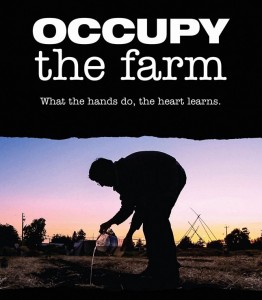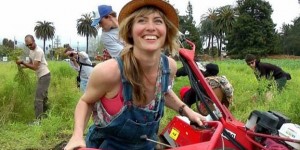 November 25, 2014 – You know popular culture is changing when documentaries about food and farming open at mainstream multiplex theatres rather than at, say, your local church basement. With its plethora of stirring stories that have all the sturm und drang of a Wagner opera, the food movement is catching the popular imagination. And so my head spun a little when, counterintuitively, I went to see Occupy the Farm at the Regal Santa Cruz 9 last Thursday night, and then on Friday attended the opening of Food Chains: The Revolution in America’s Fields at Maya Cinemas 14 in Salinas.
November 25, 2014 – You know popular culture is changing when documentaries about food and farming open at mainstream multiplex theatres rather than at, say, your local church basement. With its plethora of stirring stories that have all the sturm und drang of a Wagner opera, the food movement is catching the popular imagination. And so my head spun a little when, counterintuitively, I went to see Occupy the Farm at the Regal Santa Cruz 9 last Thursday night, and then on Friday attended the opening of Food Chains: The Revolution in America’s Fields at Maya Cinemas 14 in Salinas.
First, Food Chains. Narrated by Forest Whitaker, and featuring Eric Schlosser, Eva Longoria, Eve Ensler and many farmworkers,this is a profound film about the human condition, and the villains are not our usual suspects, like Monsanto or the owners of CAFOs. Rather, the film exposes a drama we may not have thought about recently: the financial inequities in our food supply chain. At the bottom are the farmworkers, who are mostly displaced indigenous people from south of the border. At the top are the grocery chains, corpulent with excess riches, with profits of over four trillion globally. Because of their buying power they determine the wage structures down the chain. The film asserts that farmers, often struggling to break even, are not the bad guys in this drama—they’re stuck in the middle and they’re also at the mercy of the deterministic power of corporate grocers.
 The film follows a group of south Florida tomato pickers, the Coalition of Immokalee Workers (CIW), as they hold a six-day hunger strike in front of Publix, Florida’s largest grocery chain. They’re asking the store to pay one cent more per pound, which would double their wages. It also documents the CIW’s Fair Food Program, in which food conglomerates from Walmart and Whole Foods to Taco Bell and Burger King, have agreed to buy tomatoes only from farms which meet a baseline of ethical standards, such as zero tolerance for forced labor or sexual assault in the fields. This is a Florida movement, but it has extended beyond state lines, and the film also “visits” California and Watsonville-area farms.
The film follows a group of south Florida tomato pickers, the Coalition of Immokalee Workers (CIW), as they hold a six-day hunger strike in front of Publix, Florida’s largest grocery chain. They’re asking the store to pay one cent more per pound, which would double their wages. It also documents the CIW’s Fair Food Program, in which food conglomerates from Walmart and Whole Foods to Taco Bell and Burger King, have agreed to buy tomatoes only from farms which meet a baseline of ethical standards, such as zero tolerance for forced labor or sexual assault in the fields. This is a Florida movement, but it has extended beyond state lines, and the film also “visits” California and Watsonville-area farms.
Food Chains’ title riffs off more than just the concept of chain stores and supply chains: in fact, the film shows that there are still cases of outright slavery, in which farmworkers are chained and made to work for free. For real. The film opened in over 20 cities across the U.S. simultaneously in English and Spanish. It is available on iTunes, and it is totally worth seeing. Highly recommended.
 In Occupy the Farm, by director Todd Darling, the social and economic inequities are less extreme, but it follows a similar narrative trajectory in which the little people battle the corporate structure, which in this case is UC Berkeley, which is not really a public university any more since only around 10% of its funds are public, and the rest comes from private interests including corporations like Monsanto. The film ably demonstrates that citizens have power and can create change when we mobilize.
In Occupy the Farm, by director Todd Darling, the social and economic inequities are less extreme, but it follows a similar narrative trajectory in which the little people battle the corporate structure, which in this case is UC Berkeley, which is not really a public university any more since only around 10% of its funds are public, and the rest comes from private interests including corporations like Monsanto. The film ably demonstrates that citizens have power and can create change when we mobilize.
At Gill Tract, a field research station that is owned by UC Berkeley, a group of 200 guerilla farmers—including students, faculty, activists, gardeners, homeless people, community members, and concerned others—plant 15,000 seedlings and set up a full-time encampment to protect them. Their earnest goal is to save the last piece of farmland in this area of the East Bay, since the university is poised to sell it off to developers. Soon a mixed-use complex, anchored by Whole Foods, will replace the sprawling open space. The Occupy farmers disrupt the plan, enraging the power elites.
 The university comes down on the trespassers. First they shut off the water, but the farmers are undeterred, and efforts to mobilize increase. Eventually, as access to the land is reduced, hundreds of people carry in water by the gallon, tenderly hydrating each little plant. After they’ve been kicked off the farm—by police officers in riot gear—they still manage to sneak back and hop the fence to harvest 1.5 tons of good-looking vegetables. As the Village Voice said, the film manages to be “riveting” (in a community-garden-y kind of way). It’s not surprising that the film was a huge hit when it opened in Berkeley, but it was a surprise that it got picked up by theatres in 20 cities right away.
The university comes down on the trespassers. First they shut off the water, but the farmers are undeterred, and efforts to mobilize increase. Eventually, as access to the land is reduced, hundreds of people carry in water by the gallon, tenderly hydrating each little plant. After they’ve been kicked off the farm—by police officers in riot gear—they still manage to sneak back and hop the fence to harvest 1.5 tons of good-looking vegetables. As the Village Voice said, the film manages to be “riveting” (in a community-garden-y kind of way). It’s not surprising that the film was a huge hit when it opened in Berkeley, but it was a surprise that it got picked up by theatres in 20 cities right away.
By the time you read this, these movies may no longer be showing at a theatre near you. After all, while they did make the leap to major theatres, they’re not blockbusters. They were made with blood, sweat and tears. But we’re at the start of a trend, so keep your eyes peeled for those food and farming thrillers and dramas coming to a mainstream theatre near you. Today Regal 9, tomorrow the Oscars!
About the author
Jillian Steinberger-Foster is a regenerative landscape gardener and designer. She is co-owner of Terra Nova Ecological Landscaping with her husband, contractor Ken Foster. They have a thriving homestead on the Westside of Santa Cruz and three active rescue dogs.
- Jillian Steinberger-Fosterhttps://www.ediblemontereybay.com/author/jlsteinberger/
- Jillian Steinberger-Fosterhttps://www.ediblemontereybay.com/author/jlsteinberger/
- Jillian Steinberger-Fosterhttps://www.ediblemontereybay.com/author/jlsteinberger/
- Jillian Steinberger-Fosterhttps://www.ediblemontereybay.com/author/jlsteinberger/


